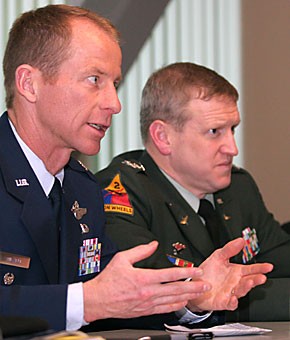UA students had a chance to pick the brains of some of the military’s top brass yesterday about issues of foreign policy, national defense and the future of combat technology.
The event was part of the Dwight D. Eisenhower National Security Series College Program, which selects panels of officers from the four Colleges of War to speak to college students interested in military issues.
Five officers spoke to a gathering sponsored by the Association for Defense and Strategic Analysis, a campus club for students interested in discussing military and policy issues.
“”These are senior officers, the next generation of generals,”” said Chris Demchak, an associate professor in the school of public administration and policy and the ADSA’s faculty adviser.
The panel was primarily a question-and-answer session, kept lively by a bevy of questions about current events ranging from Iran’s potential nuclear capabilities to China’s military build-up.
“”China watched the U.S. go to war in Iraq, and there was a lot of self-reflection, wondering, ‘Can we do that?'”” said Lt. Col. Dave Stilwell, United States Air Force. “”They don’t want to be left behind.””
Stilwell, an F-16 pilot with more than 25 years of Air Force experience primarily in Asia, said that while China has been building its military capabilities and cooperating with Russia to help combat terrorism, he thinks that a combined communist force against America is not likely.
“”It’s never going to happen,”” Stilwell said. “”There are just too many conflicting interests involved.””
Other questions probed the future of the military, which U.S. Army Col. J.J. Frazier, a technology expert, said is primarily focused on collecting and communicating more information across the battlefield, but also on advances in automation.
“”You may have seen that movie ‘Stealth’ and thought it was pretty far-fetched, but technology is moving farther and farther into the realm of artificial intelligence,”” Frazier said. “”The caution is: once we take the pilot out of the cockpit, I have a fear.””
Jake Knutson, a non-degree-seeking graduate student, said the panel gave him a chance to hear viewpoints he has not heard articulated by other parts of the military.
“”They seemed very honest in answering questions,”” Knutson said. “”It was a nice opportunity to talk. The ROTC doesn’t like to answer these kind of questions.””
Guest speakers like these are the highlight of the club’s activities, said club president Jordan Johnson, a computer engineering junior. Other activities include monthly simulations, where club members role-play through possible solutions to international issues.
Johnson said that while the conclusions of the club’s simulations may not be the most likely, they give the students a chance to put their interests in world policy into practice and realize the complexity of foreign affairs.
“”It helps increase the whole club’s knowledge of an issue,”” Johnson said. “”Not just policy knowledge, but cultural knowledge, too.””









